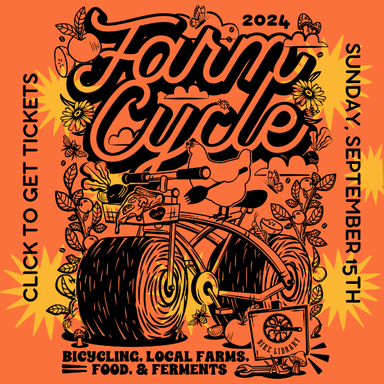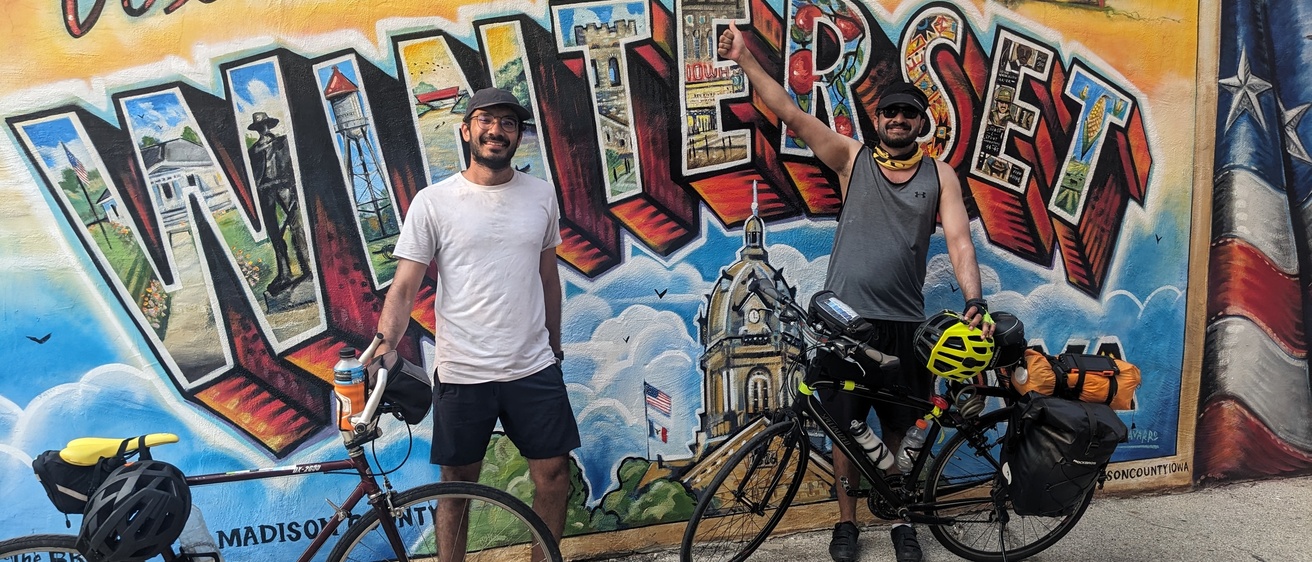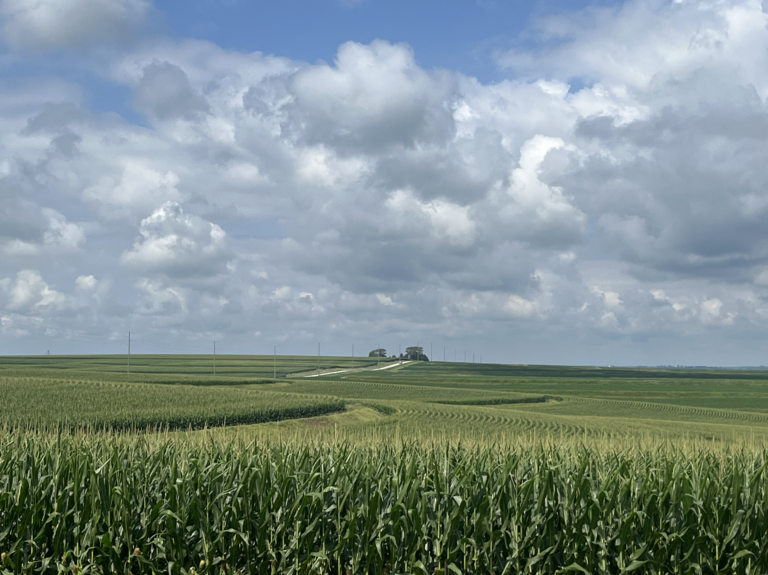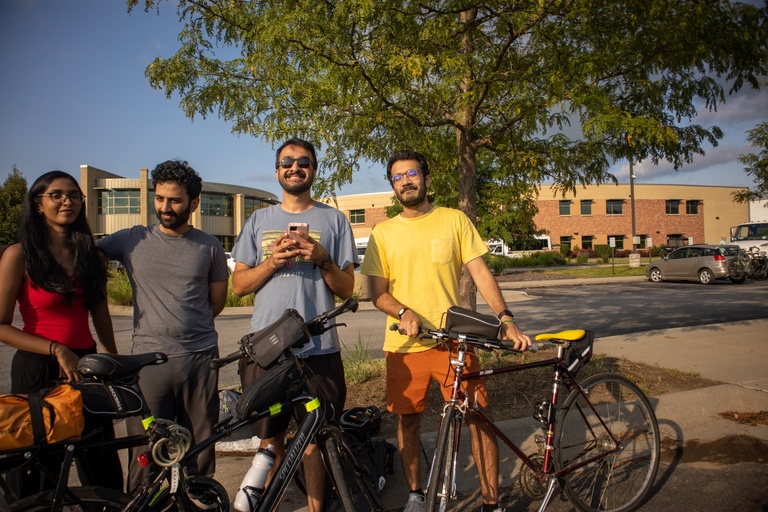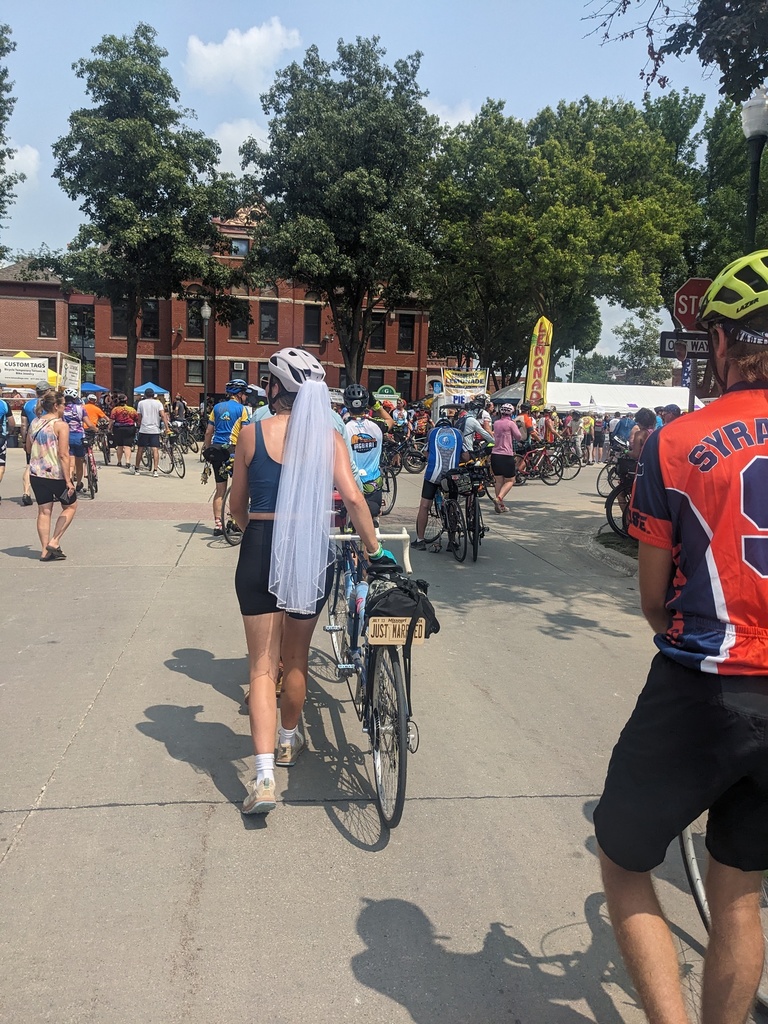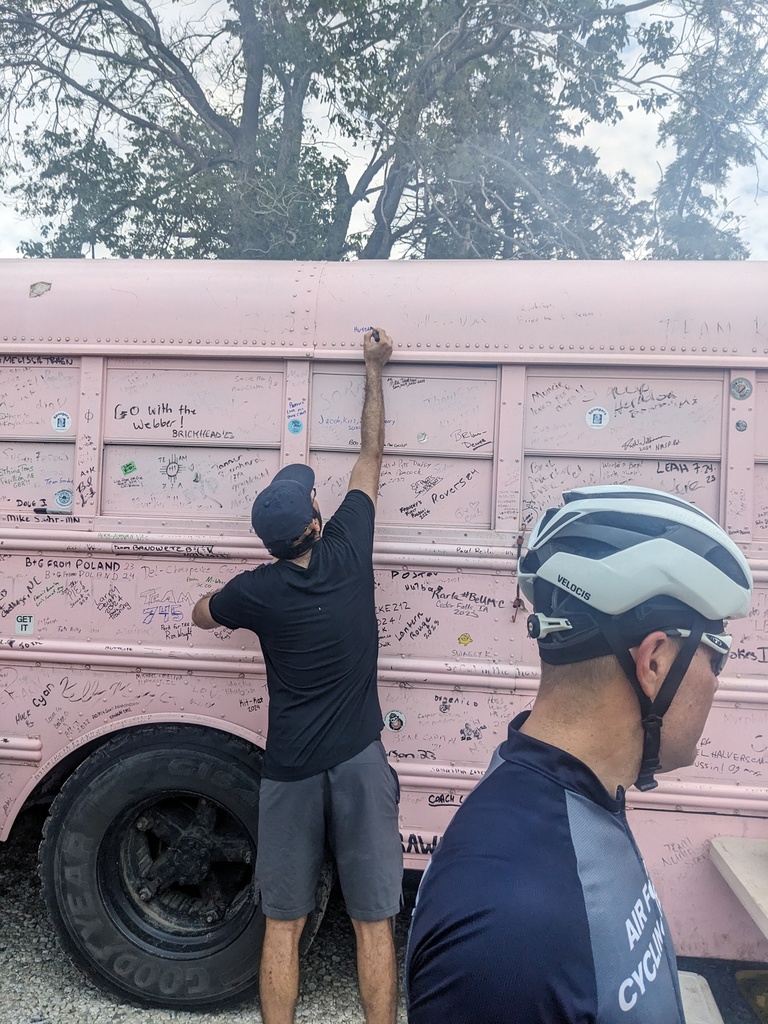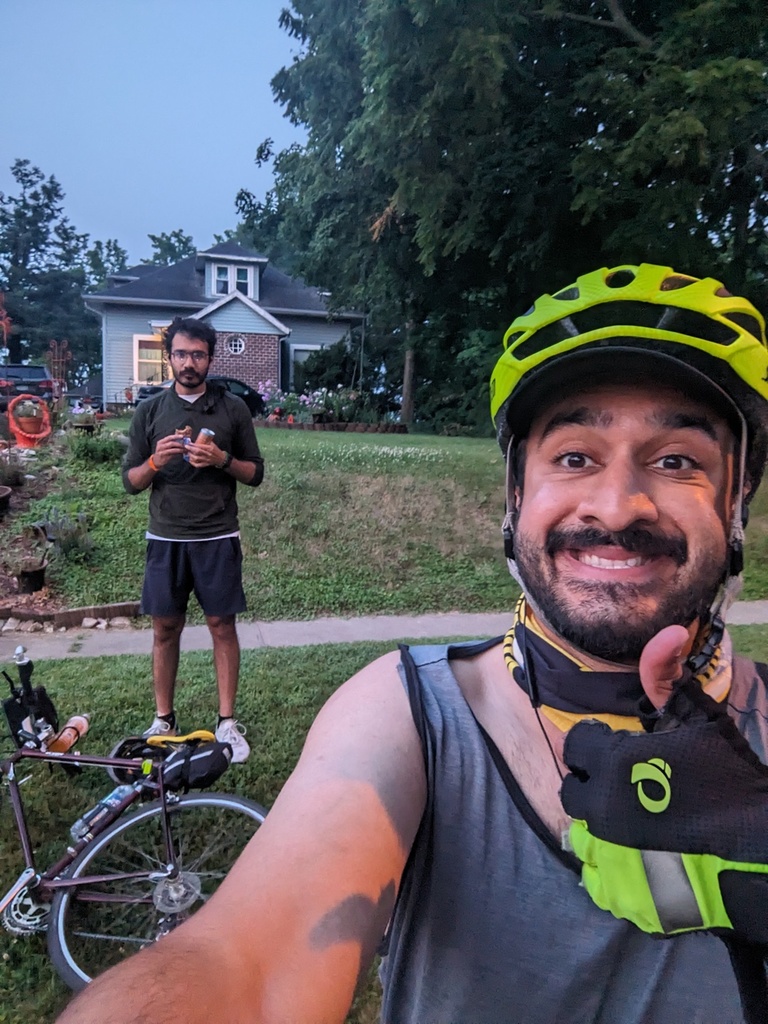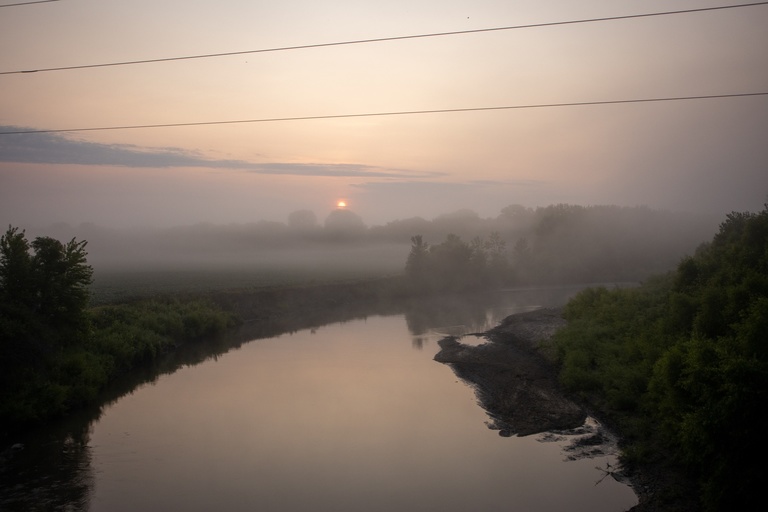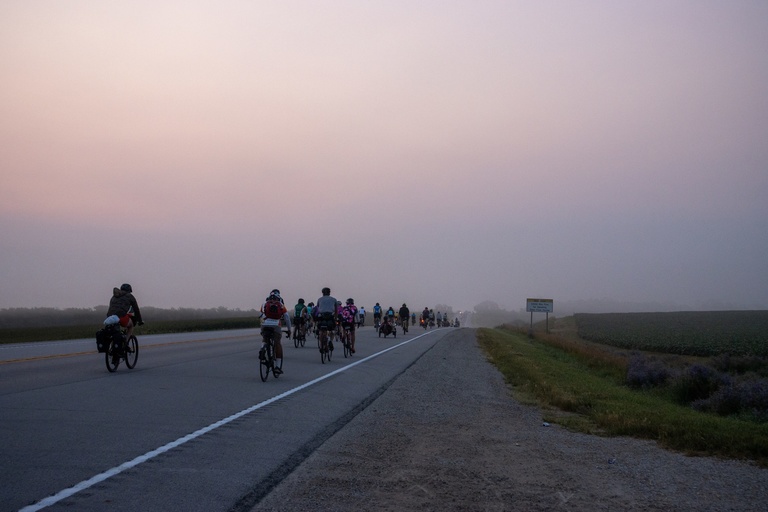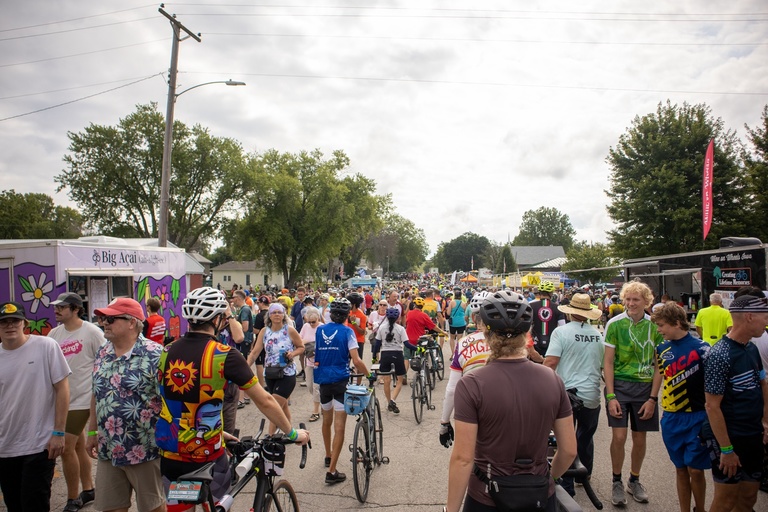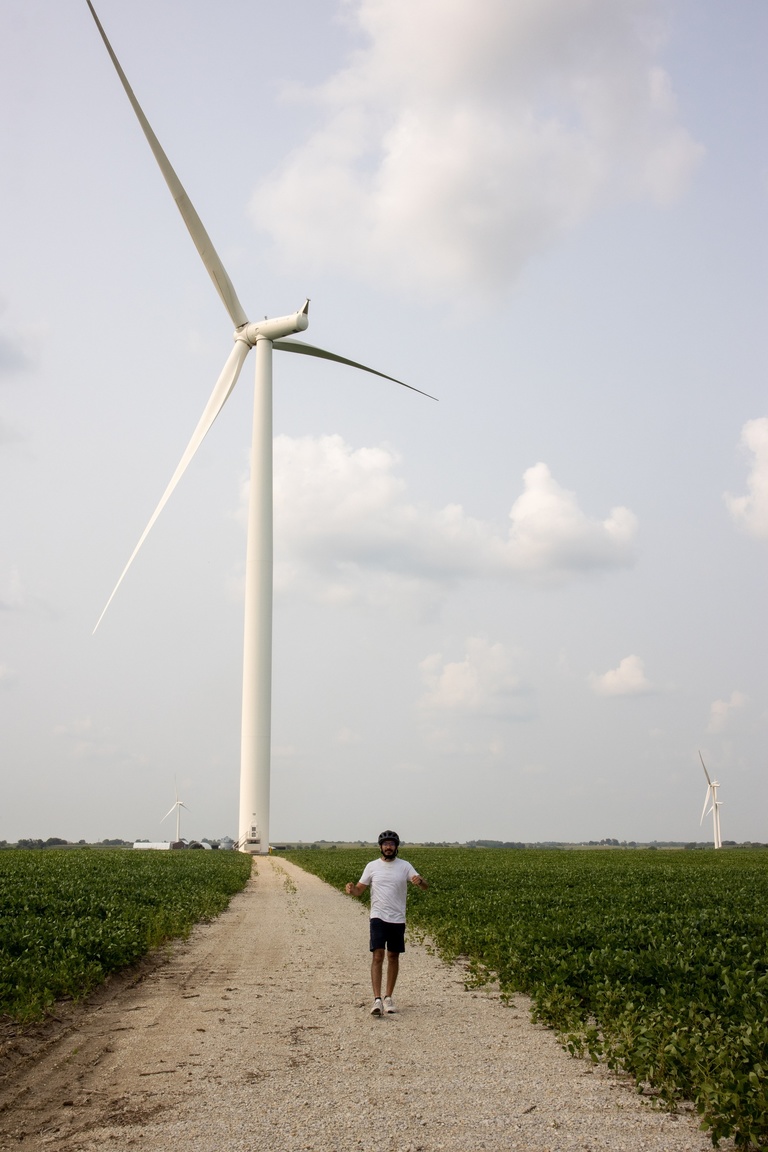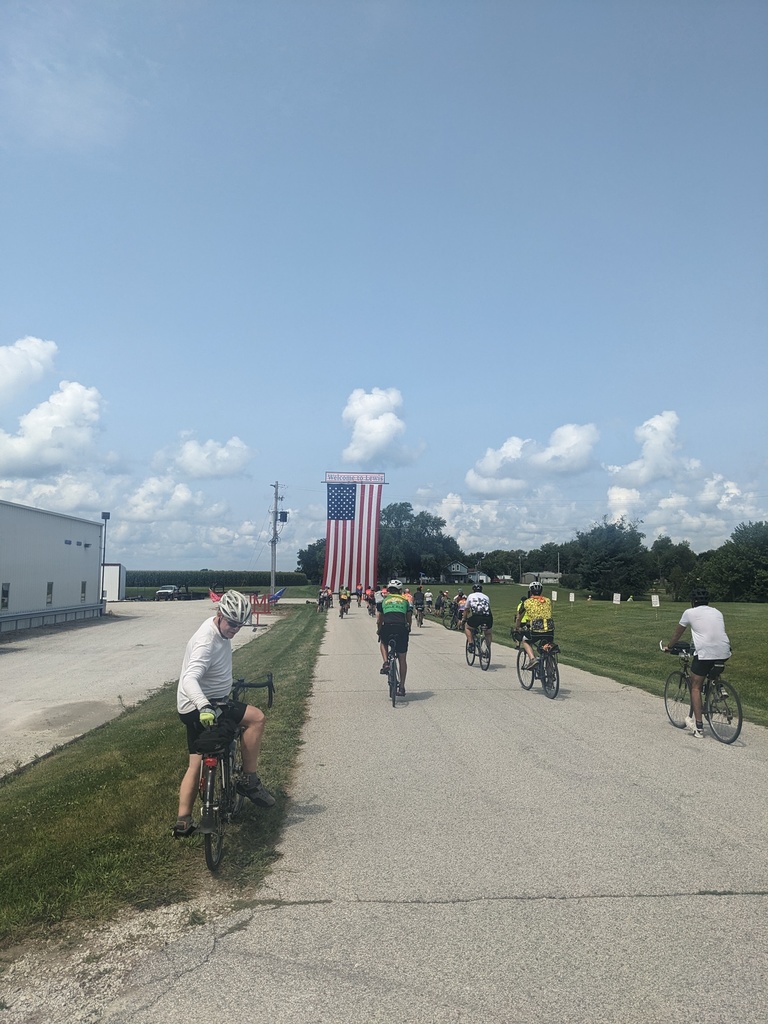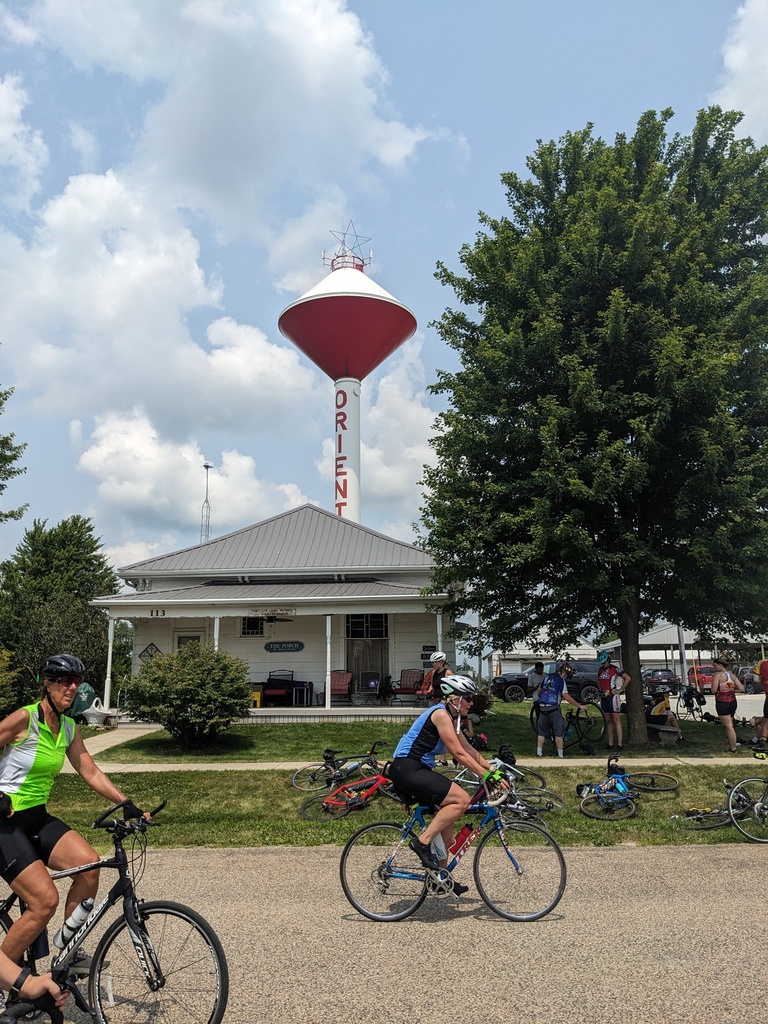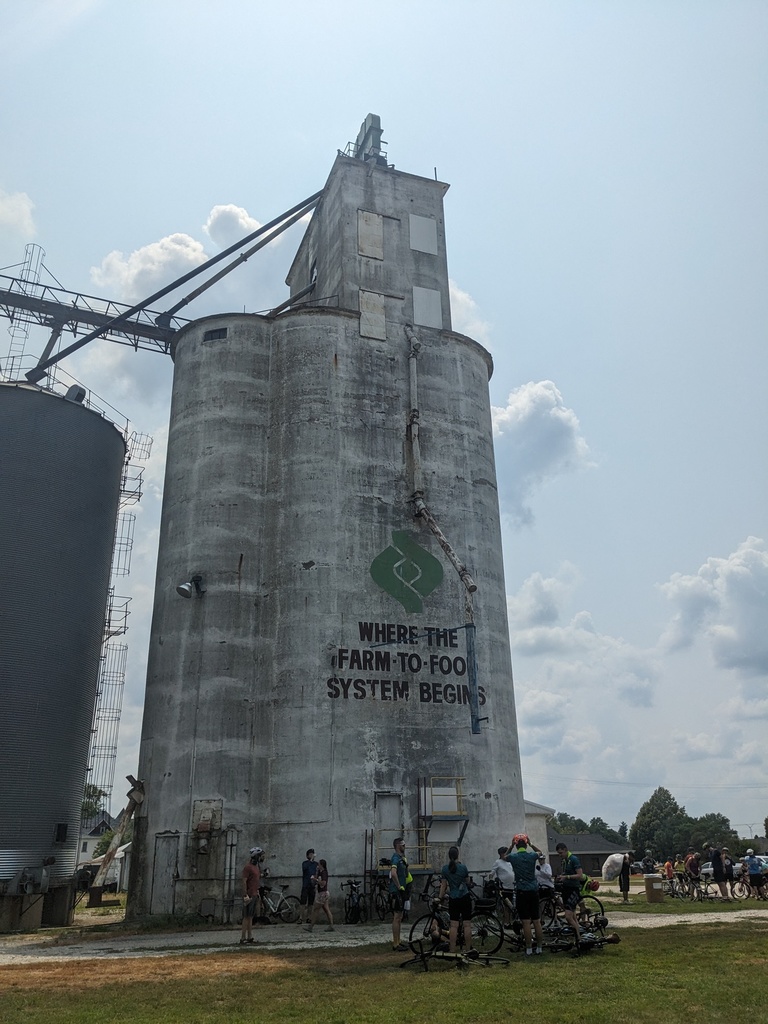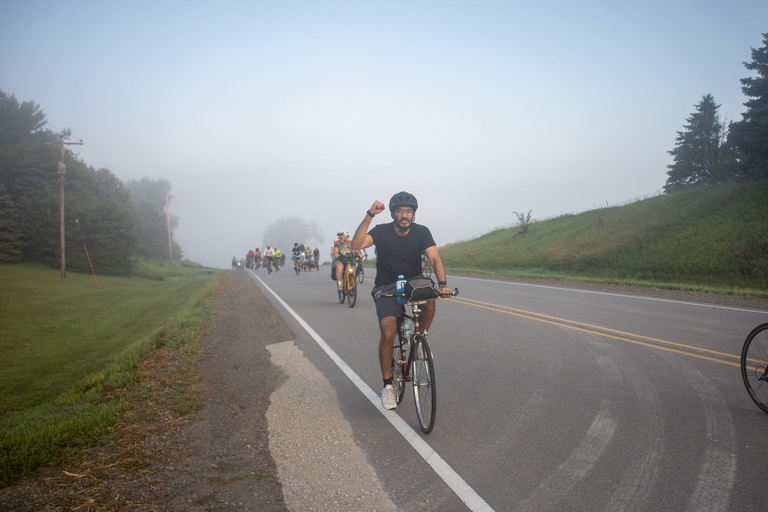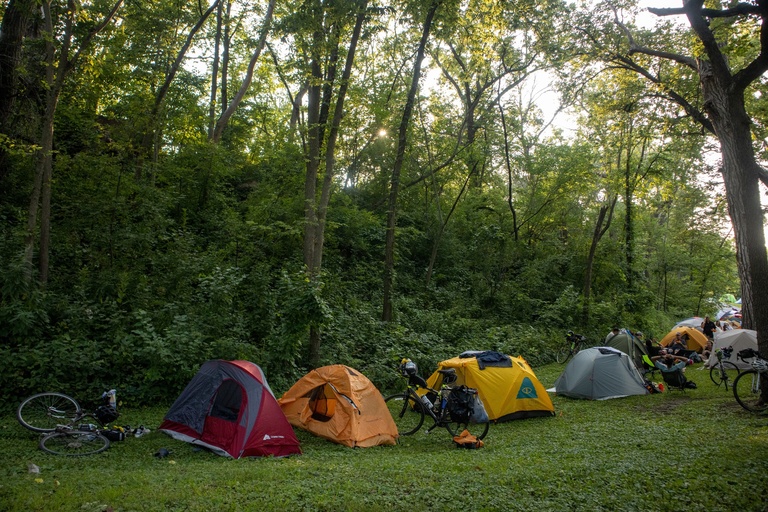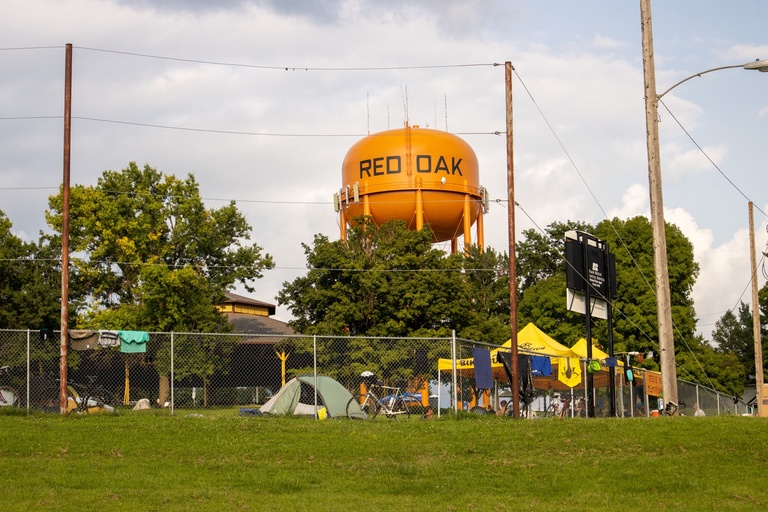
Sixth year CS PhD students Hussam Habib and Osama Khalid joined forces in July 2024 to ride the first few days of RAGBRAI LI and share some highlights, insights, and advice for fellow students.
[Read even more about Hussam's experience in blog post entitled "RAGBRAI - A Journey Through Iowa" Sneak peak quotes below! - Osama's own blog is here.]
What inspired you to decide to ride in RAGBRAI LI? Had you ridden past edition or other long-distance rides?

Habib: After spending about 5 years in Iowa, it felt unjust to have not explored the state. Being in the final stages of my school, the idea of doing nothing but biking, eating, visiting small towns, and stargazing sounded like an amazing way to see places I had never been to. That, and having a friend who had already planned on doing it, was exactly the push I needed. This was my first RAGBRAI and first ever long-distance ride of any sorts.

Khalid: Two things on my Iowa bucket-list have always been attending the state fair and completing RAGBRAI. Since I am at the tail-end of my grad journey, this summer was probably my last chance to experience either.
Between the two, the state fair seems easier: you just drive to Des Moines, check out the butter cow, have some funnel cake, and call it a day.
RAGBRAI, on the other hand, has always felt like more of a challenge.

RAGBRAI, or Register's Annual Great Bicycle Ride Across Iowa, is a non-competitive bike tour across the state of Iowa. Traditionally you start by dunking your bike’s rear wheel in the Missouri River on the western border of the state and end by dunking your front wheel in the Mississippi River on the eastern border.
After my proposal defense, I found myself in a bit of a funk, experiencing academic burnout. To clear my head, I started biking every other morning. Having not biked all winter—and most of last summer—the first couple of weeks were challenging. But once I settled into a routine, I found myself biking more frequently and for longer distances. What started as trips to Terry Trueblood turned into rides to Coralville, which eventually expanded into trips to Tiffin.
After a few weeks, I had gained enough confidence in my biking ability to consider finally signing up for RAGBRAI LI.
My training regimen mostly consisted of biking to, and photographing all the new Herky on Parade statues. I would try to bike 10-20 miles every other day and on weekends. I went for longer rides, starting with North Liberty and eventually building up to rides to Solon, IA.
I was mostly done with the preparations. I had installed a rear rack on my bike, gotten pannier bags for the rack, gotten a compact tent and sleeping pad for myself, was easily biking over a 100 miles a week and was more or less ready.
My concerns shifted to the more practical. During RAGBRAI, how do I keep my friends and family updated without actively sharing my GPS location with them. I hacked together a webpage that jerry-rigged the “Where’s my phone” feature on android to update my location. Basically I had made a tool to dox myself (For obvious privacy reasons, the page stopped updating once RAGBRAI was done).
Hussam had not ridden much and did not own a bike days before the ride’s departure: could you please elaborate?
Habib: The last bike I owned was when I was eight, and that bike had foam tires. Other than the occasional rental city bikes I had barely ridden any bikes. To set the scene, RAGBRAI was starting on a Saturday and I had a paper submission due on Tuesday. After submitting the paper and making the last-minute decision to ride in RAGBRAI, I had three days to find a bike. Osama and Matthieu were super helpful in this, directing me towards Facebook marketplace and the bike library. Audrey, the director of the Bike Library, expertly shortlisted suitable bikes for me, from which which I bought a Panasonic bike for $70. The day before RAGBRAI, in a crash-course on bike mechanics, Osama and I spent five hours at the Bike Library repairing and fixing the bike, guided by Walter: the bike magician at the library. I only rode the bike hours before RAGBRAI and it worked perfectly—or at least I wouldn't have known if there was anything wrong with it.

One of my fondest memories from RAGBRAI will always be learning the mechanics of a bike and repairing it myself. It’s a special feeling to see simple metal parts come together to create a complex mechanical device and to feel in control of that machine. [Habib]
Khalid: I have been collaborating with Hussam since last semester. During one of our meetings I had mentioned that I was planning to go to RAGBRAI this year. Like most people, Hussam told me it sounded fun and he would definitely want to go on a week-long bike ride as well. Almost everyone expresses an aspiration to go on RAGBRAI, but almost no one follows through.
So, I was understandably surprised when the Tuesday before RAGBRAI, Hussam got in touch and told me that he had just gotten done with a paper submission and now was ready to go to RAGBRAI. I was a bit hesitant about Hussam’s decision, especially after he told me that he didn’t have a bike. On top of that, he had a very tight budget($200).
On Wednesday, Hussam and I went to Walmart to look for bikes, and we also visited the Iowa City Bike Library. Audrey Wiedemeier at the Bike Library was quite relieved that we didn’t buy a bike at Walmart because, as she put it, “Friends don’t let friends buy bikes from Walmart,”. Instead she suggested that Hussam keep looking for bikes on Facebook Marketplace and bring in whatever he finds to the Bike Library by Friday so we could fix it up.
On Thursday, Hussam called me and told me that he had found a $70 road bike—an ancient Panasonic road bike with downtube shifters.
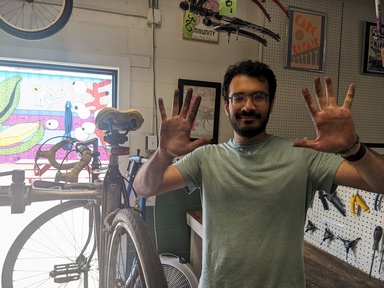
On Friday, we were at the Bike Library as soon as it opened. We had to more or less overhaul the entire bike. After almost the entire day at the bench, we had the bike revamped --- from new brakes to a new chain, we had even replaced the drop bars with an upright handlebar. We were the first people in the Library when they opened and the last ones out when they closed. At this point we were quite intimately acquainted with each and every nut and bolt of the bike, and by the end of the day, both Hussam and I had bikes. Hussam ending up spending a total of $137 (well below the $200 budget) on his bike.
On Saturday, our friends dropped us off at Glenwood for the start of RAGBRAI.
RAGBRAI is a week-long bike ride, but also much more: what were some of the highlights? Any challenges?
Habib: Thinking of RAGBRAI before, I had images of speed and exhilaration. In reality, I found the experience
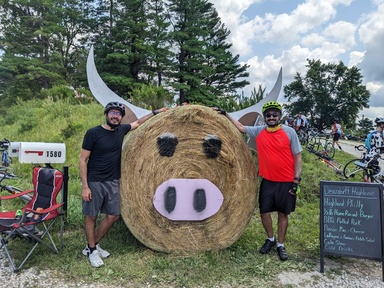
to be slowing and deliberate. In the enclosed space of a car, the scenery and people around you pass by, becoming a blur. On a bike, everything felt closer, bigger, and more awe-inspiring. Other than the wildflower-spattered rolling hills, my favorite part was visiting the small towns in between, meeting locals and people-watching. Thankfully I did not encounter any mechanical challenges however, even if I had, I felt surrounded by very helpful, kind, and excited people—really representing the Iowa nice energy.
Khalid: Even though there are plenty of ways to experience Iowa, for many, this experience is limited to speeding along I-80, catching only brief glimpses of The Quad Cities, Iowa City/Cedar Rapids, Des Moines, and Council Bluffs/Omaha. Reducing the state to little more than a highway flanked by cornfields.
But what if you tried to be subversive? Instead of rushing through the cornfields, you could take your time, traveling at a leisurely pace through small towns. This is the essence of RAGBRAI.
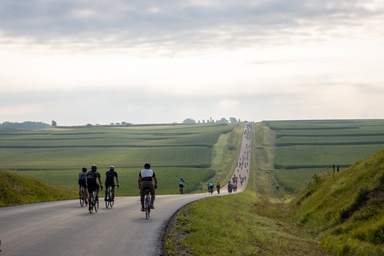
RAGBRAI is more than just a bike ride; it’s a rolling celebration of Iowa’s diverse cultures --- a party on wheels. Each town you pass through has its own unique character, shaped by its history and local flavor.
This year, we went through Silver City with its population of just 245. Hidden in the Loess Hills, this farming cooperative served us raspberry pies for breakfast, reflecting the town's agricultural roots.
The variety in scenery, from rural landscapes to charming small-town streets, made every day of the ride a new adventure.
We also went through Greenfield, a town that had been ravaged by a tornado. It was quite humbling to see how the community had come together to rebuild. The resilience and warmth of the people in Greenfield were evident as they welcomed us with open arms, sharing stories of the tornado and how they supported one another in the aftermath. Despite the challenges they faced, their spirit remained unbroken, and it was a powerful reminder of the strength of these small-town communities.
Though July in Iowa can be scorching, with afternoons that make riding a slog, the mornings always made up for it. Riding through fields still drenched in early morning mist, you come to understand the true meaning of that famous “Field of Dreams” quote.
“Is this heaven?”, “It’s Iowa”, “Iowa? I could have sworn this was heaven.” While I’m always amused by this, if your idea of heaven is one of peace, calm, and a richer version of the Windows XP default wallpaper, then Iowa might just be heaven for you. [Habib]
While this was a personal and not a professional/research endeavor, any overlap with your CS skills or interests?
Habib: Being locked in with your research really shapes a sharp and directed focus, but that often lacks the breadth of reality. I have found such endeavors and travelling particularly helpful in restoring my focus and bringing new perspectives.
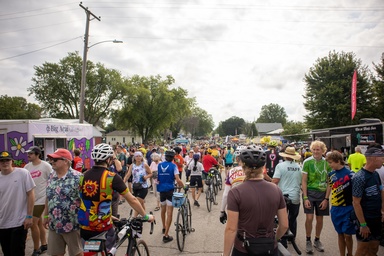
Khalid: At some point during grad school, you have an epiphany: instead of comparing yourself to your peers, you realize that the only person you should be competing with is yourself, trying to be better. The sooner you embrace this mindset, the better your grad school experience will be.
RAGBRAI is no different. It’s not a race against others; the only person you need to focus on is yourself. However, since everyone is on a bike, trying to get from point A to point B, it’s easy to forget this and start competing with other cyclists. But whenever that happens, you’re quickly reminded of your place. You might be pedaling hard, trying to go as fast as you can, only to be effortlessly passed by someone on rollerblades or see someone running along the route. These moments of humility make you question why you’re turning a fun experience into a competition. After all, there are dogs on bikes having the time of their lives, and here you are, trying to turn it into a race.
This same shift in perspective applies beyond just grad school or biking; it’s a lesson in how different aspects of life, even those that seem unrelated, can be interconnected.
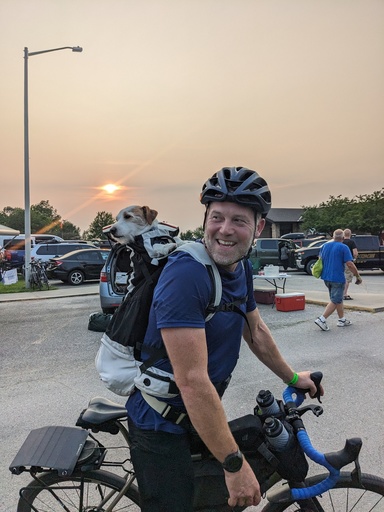
The biggest pitfall of grad school is thinking that everything you learn is insular. In reality, the experience is holistic and translates to other areas of life. At first glance, computer science and biking may seem like polar opposites—one involves a sedentary lifestyle working with software, while the other is physically active and involves hardware. However, both require problem-solving and the ability to break down complex tasks into simpler, more manageable steps.
A perfect example is when we fixed Hussam’s bike. We had to assess the bike’s issues systematically, identify the problem, research how to fix it, and break down the repairs into manageable steps. [Khalid]
This is the same approach we use in computer science: start with a complex problem, analyze it, and tackle it piece by piece until you reach a solution. The satisfaction of overcoming these challenges, whether it’s debugging code or fine-tuning a bike, is remarkably similar. In both cases, persistence and a methodical approach lead to success, making the experience all the more rewarding.
Would you recommend this and other physical/cultural outings to our constituents?
Habib: Yes, I would a 100% recommend everyone and anyone to sign up for the next RAGBRAI or similar outings!
I am convinced that the beauty of this scenery is most rewarding when viewed from the seat of a bike. The deliberation and slowness that biking through the hills brings to the experience should be studied scientifically. [Habib]
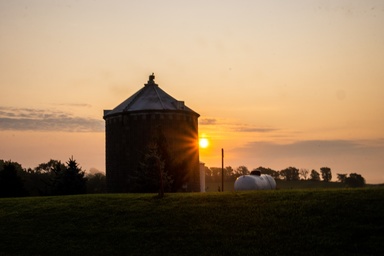
Khalid: Absolutely! I would highly recommend RAGBRAI and similar physical and cultural outings to anyone looking for a unique and enriching experience. No one’s experience of Iowa should be limited only to the cities --- Iowa City, Ames or Des Moines. Iowa deserves to be experienced slowly and completely, with deliberate effort and attention paid not just to its urban centers, but also to the many, small, sprawling communities that make up most of Iowa.
Only by seeing its remote towns, its small rural churches, and by meeting the people whose families have lived on these lands for generations, can the experience of Iowa be complete. [Khalid]
